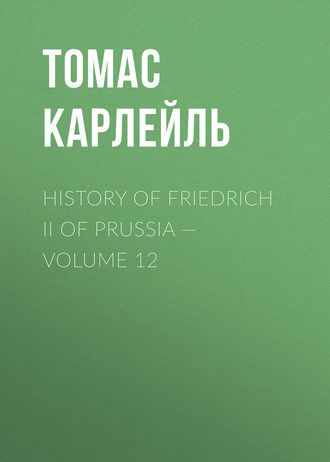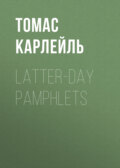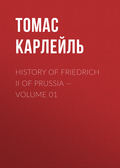
Томас Карлейль
History of Friedrich II of Prussia — Volume 12
TEUTSCHLAND TO BE CARVED INTO SOMETHING OF SYMMETRY, SHOULD THE BELLEISLE ENTERPRISES SUCCEED
Belleisle's schemes, in the rear of all this labor, are grandiose to a degree. Men wonder at the First Napoleon's mad notions in that kind. But no Napoleon, in the fire of the revolutionary element; no Sham-Napoleon, in the ashes of it: hardly a Parisian Journalist of imaginative turn, speculating on the First Nation of the Universe and what its place is,—could go higher than did this grandiose Belleisle; a man with clear thoughts in his head, under a torpid Louis XV. Let me see, thinks Belleisle. Germany with our Bavarian for Kaiser; Germany to be cut into, say, Four little Kingdoms: 1. Bavaria with the lean Kaiserhood; 2. Saxony, fattened by its share of Austria; 3. Prussia the like; 4. Austria itself, shorn down as above, and shoved out to the remote Hungarian parts: VOILA. These, not reckoning Hanover, which perhaps we cannot get just yet, are Four pretty Sovereignties. Three, or Two, of these hireable by gold, it is to be hoped. And will not France have a glorious time of it; playing master of the revels there, egging one against the other! Yes, Germany is then, what Nature designed it, a Province of France: little George of Hanover himself, and who knows but England after him, may one day find their fate inevitable, like the others. O Louis, O my King, is not this an outlook? Louis le Grand was great; but you are likely to be Louis the Grandest; and here is a World shaped, at last, after the real pattern!
Such are, in sad truth, Belleisle's schemes; not yet entirely hatched into daylight or articulation; but becoming articulate, to himself and others, more and more. Reader, keep them well in mind: I had rather not speak of them again. They are essential to our Story; but they are afflictively vain, contrary to the Laws of Fact; and can, now or henceforth, in nowise be. My friend, it was not Beelzebub, nor Mephistopheles, nor Autolyeus-Apollo that built this world and us; it was Another. And you will get your crown well rapped, M. le Marechal, for so forgetting that fact! France is an extremely pretty creature; but this of making France the supreme Governor and God's-Vicegerent of Nations, is, was, and remains, one of the maddest notions. France at its ideal BEST, and with a demi-god for King over it, were by no means fit for such function; nay of many Nations is eminently the unfittest for it. And France at its WORST or nearly so, with a Louis XV. over it by way of demi-god—O Belleisle, what kind of France is this; shining in your grandiose imagination, in such contrast to the stingy fact: like a creature consisting of two enormous wings, five hundred yards in potential extent, and no body bigger than that of a common cock, weighing three pounds avoirdupois. Cock with his own gizzard much out of sorts, too!
It was "early in March" [Adelung, ii. 305.] when Belleisle, the Artificial Sun-god, quitted Paris on this errand. He came by the Moselle road; called on the Rhine Kurfursts, Koln, Trier, Mainz; dazzling them, so far as possible, with his splendor for the mind and for the eye. He proceeded next to Dresden, which is a main card: and where there is immense manipulation needed, and the most delicate trout-tickling; this being a skittish fish, and an important, though a foolish. Belleisle was at Dresden when the Battle of Mollwitz fell out: what a windfall into Belleisle's game! He ran across to Friedrich at Mollwitz, to congratulate, to consult,—as we shall see anon.
Belleisle, I am informed, in this preliminary Tour of his, speaks only, or hints only (except in the proper quarters), of Election Business; of the need there perhaps is, on the part of an Age growing in liberal ideas, to exclude the Austrian Grand-Duke; to curb that ponderous, harsh, ungenerous House of Austria, too long lording it over generous Germany; and to set up some better House,—Bavaria, for example; Saxony, for example? Of his plans in the rear of this he is silent; speaks only by hints, by innuendoes, to the proper parties. But ripening or ripe, plans do lie to rear; far-stretching, high-soaring; in part, dark even at Versailles; darkly fermenting, not yet developed, in Belleisle's own head; only the Future Kaiser a luminous fixed point, shooting beams across the grandiose Creation-Process going on there.
By the end of August, 1741, Belleisle had become certain of his game; 24th January, 1742, he saw himself as if winner. Before August, 1741, he had got his Electors manipulated, tickled to his purpose, by the witchery of a Phoebus-Autolycus or Diplomatic Sun-god; majority secured for a Bavarian Kaiser, and against an Austrian one. And in the course of that month,—what was still more considerable!—he was getting, under mild pretexts, about a hundred thousand armed Frenchmen gently wafted over upon the soil of Germany. Two complete French Armies, 40,000 each (PLUS their Reserves), one over the Upper Rhine, one over the Lower; about which we shall hear a great deal in time coming! Under mild pretexts: "Peaceable as lambs, don't you observe? Merely to protect Freedom of Election, in this fine neighbor country; and as allies to our Friend of Bavaria, should he chance to be new Kaiser, and to persist in his modest claims otherwise." This was his crowning stroke. Which finished straightway the remnants of Pragmatic Sanction and of every obstacle; and in a shining manner swept the roads clear. And so, on January 24th following, the Election, long held back by Belleisle's manoeuvrings, actually takes effect,—in favor of Karl Albert, our invaluable Bavarian Friend. Austria is left solitary in the Reich; Pragmatic Sanction, Keystone of Nature, which Belleisle and France had sworn to keep in, is openly torn out by Belleisle and by France and the majority of mankind; and Belleisle sees himself, to all appearance, winner.
This was the harvest reaped by Belleisle, within year and day; after endless manoeuvring, such as only a Belleisle in the character of Diplomatic Sun-god could do. Beyond question, the distracted ambitions of several German Princes have been kindled by Belleisle; what we called the rotten thatch of Germany is well on fire. This diligent sowing in the Reich—to judge by the 100,000, armed men here, and the counter hundreds of thousands arming—has been a pretty stroke of dragon's-teeth husbandry on Belleisle's part.
BELLEISLE ON VISIT TO FRIEDRICH; SEES FRIEDRICH BESIEGE BRIEG, WITH EFFECT
It was April 26th when Marechal de Belleisle, with his Brother the Chevalier, with Valori and other bright accompaniment, arrived in Friedrich's Camp. "Camp of Mollwitz" so named; between Mollwitz and Brieg; where Friedrich is still resting, in a vigilant expectant condition; and, except it be the taking of Brieg, has nothing military on hand. Wednesday, 26th April, the distinguished Excellency—escorted for the last three miles by 120 Horse, and the other customary ceremonies—makes his appearance: no doubt an interesting one to Friedrich, for this and the days next following. Their talk is not reported anywhere: nor is it said with exactitude how far, whether wholly now, or only in part now, Belleisle expounded his sublime ideas to Friedrich; or what precise reception they got. Friedrich himself writes long afterwards of the event; but, as usual, without precision, except in general effect. Now, or some time after, Friedrich says he found Belleisle, one morning, with brow clouded, knit into intense meditation: "Have you had bad news, M. le Marechal?" asks Friedrich. "No, oh no! I am considering what we shall make of that Moravia?"—"Moravia; Hm!" Friedrich suppresses the glance that is rising to his eyes: "Can't you give it to Saxony, then? Buy Saxony into the Plan with it!" "Excellent," answers Belleisle, and unpuckers his stern brow again.
Friedrich thinks highly, and about this time often says so, of the man Belleisle: but as to the man's effulgencies, and wide-winged Plans, none is less seduced by them than Friedrich: "Your chickens are not hatched, M. le Marechal; some of us hope they never will be,—though the incubation-process may have uses for some of us!" Friedrich knows that the Kaisership given to any other than Grand-Duke Franz will be mostly an imaginary quantity. "A grand Symbolic Cloak in the eyes of the vulgar; but empty of all things, empty even of cash, for the last Two Hundred Years: Austria can wear it to advantage; no other mortal. Hang it on Austria, which is a solid human figure,—so." And Friedrich wishes, and hopes always, Maria Theresa will agree with him, and get it for her Husband. "But to hang it on Bavaria, which is a lean bare pole? Oh, M. le Marechal!—And those Four Kingdoms of yours: what a brood of poultry, those! Chickens happily yet UNhatched;—eggs addle, I should venture to hope:—only do go on incubating, M. le Marechal!" That is Friedrich's notion of the thing. Belleisle stayed with Friedrich "a few days," say the Books. After which, Friedrich, finding Belleisle too winged a creature, corresponded, in preference, with Fleury and the Head Sources;—who are always intensely enough concerned about those "aces" falling to him, and how the same are to be "shared." [Details in Helden-Geschichte, i. 912, 962, 916; in OEuvres de Frederic, ii. 79, 80; &c.]
Instead of parade or review in honor of Belleisle, there happened to be a far grander military show, of the practical kind. The Siege of Brieg, the Opening of the Trenches before Brieg, chanced to be just ready, on Belleisle's arrival:—and would have taken effect, we find, that very night, April 26th, had not a sudden wintry outburst, or "tempest of extraordinary violence," prevented. Next night, night of the 27th-28th, under shine of the full Moon, in the open champaign country, on both sides of the River, it did take effect. An uncommonly fine thing of its sort; as one can still see by reading Friedrich's strict Program for it,—a most minute, precise and all-anticipating Program, which still interests military men, as Friedrich's first Piece in that kind,—and comparing therewith the Narratives of the performance which ensued. [Ordre und Dispositiones (SIC), wornach sich der General-Lieutenant von Kalckstein bei Eroffnung der Trancheen, &c. (Oeuvres de Frederic, xxx. 39-44): the Program. Helden-Geschichte, i. 916-928: the Narrative.]
Kalkstein, Friedrich's old Tutor, is Captain of the Siege; under him Jeetz, long used to blockading about Brieg. The silvery Oder has its due bridges for communication; all is in readiness, and waiting manifold as in the slip,—and there is Engineer Walrave, our Glogau Dutch friend, who shall, at the right instant, "with his straw-rope (STROHSEIL) mark out the first parallel," and be swift about it! There are 2,000 diggers, with the due implements, fascines, equipments; duly divided, into Twelve equal Parties, and "always two spademen to one pickman" (which indicates soft sandy ground): these, with the escorting or covering battalions, Twelve Parties they also, on both sides of the River, are to be in their several stations at the fixed moments; man, musket, mattock, strictly exact. They are to advance at Midnight; the covering battalions so many yards ahead: no speaking is permissible, nor the least tobacco-smoking; no drum to be allowed for fear of accident; no firing, unless you are fired on. The covering battalions are all to "lie flat, so soon as they get to their ground, all but the Officers and sentries." To rear of these stand Walrave and assistants, silent, with their straw-rope;—silent, then anon swift, and in whisper or almost by dumb-show, "Now, then!" After whom the diggers, fascine-men, workers, each in his kind, shall fall to, silently, and dig and work as for life.
All which is done; exact as clock-work: beautiful to see, or half see, and speak of to your Belleisle, in the serene moonlight! Half an hour's marching, half an hour's swift digging: the Town-clock of Brieg was hardly striking One, when "they had dug themselves in." And, before daybreak, they had, in two batteries, fifty cannon in position, with a proper set of mortars (other side the River),—ready to astonish Piccolomini and his Austrians; who had not had the least whisper of them, all night, though it was full moon. Graf von Piccolomini, an active gallant person, had refused terms, some time before; and was hopefully intent on doing his best. And now, suddenly, there rose round Piccolomini such a tornado of cannonading and bombardment, day after day, always "three guns of ours playing against one of theirs," that his guns got ruined; that "his hay-magazines took fire,"—and the Schloss itself, which was adjacent to them, took fire (a sad thing to Friedrich, who commanded pause, that they might try quenching, but in vain):—and that, in short, Piccolomini could not stand it; but on the 4th of May, precisely after one week's experience, hung out the white flag, and "beat chamade at 3 of the afternoon." He was allowed to march out next morning, with escort to Neisse; parole pledged, Not to serve against us for two years coming.
Friedrich in person (I rather guess, Belleisle not now at his side) saw the Garrison march out;—kept Piccolomini to dinner; a gallant Piccolomini, who had hoped to do better, but could not. This was a pretty enough piece of Siege-practice. Torstenson, with his Swedes, had furiously besieged Brieg in 1642, a hundred years ago; and could do nothing to it. Nothing, but withdraw again, futile; leaving 1,400 of his people dead. Friedrich, the Austrian Garrison once out, set instantly about repairing the works, and improving them into impregnability,—our ugly friend Walrave presiding over that operation too.
Belleisle, we may believe, so long as he continued, was full of polite wonder over these things; perhaps had critical advices here and there, which would be politely received. It is certain he came out extremely brilliant, gifted and agreeable, in the eyes of Friedrich; who often afterwards, not in the very strictest language, calls him a great man, great soldier, and by far the considerablest person you French have. It is no less certain, Belleisle displayed, so far as displayable, his magnificent Diplomatic Ware to the best advantage. To which, we perceive, the young King answered, "Magnificent, indeed!" but would not bite all at once; and rather preferred corresponding with Fleury, on business points, keeping the matter dexterously hanging, in an illuminated element of hope and contingency, for the present.
Belleisle, after we know not how many days, returned to Dresden; perfected his work at Dresden, or shoved it well forward, with "that Moravia" as bait. "Yes, King of Moravia, you, your Polish Majesty, shall be!"—and it is said the simple creature did so style himself, by and by, in certain rare Manifestoes, which still exist in the cabinets of the curious. Belleisle next, after only a few days, went to Munchen; to operate on Karl Albert Kur-Baiern, a willing subject. And, in short, Belleisle whirled along incessantly, torch in hand; making his "circuit of the German Courts,"—details of said circuit not to be followed by us farther. One small thing only I have found rememberable; probably true, though vague. At Munchen, still more out at Nymphenburg, the fine Country-Palace not far off, there was of course long conferencing, long consulting, secret and intense, between Belleisle with his people and Karl Albert with his. Karl Albert, as we know, was himself willing. But a certain Baron von Unertl—heavy-built Bavarian of the old type, an old stager in the Bavarian Ministries—was of far other disposition. One day, out at Nymphenburg, Unertl got to the Council-room, while Belleisle and Company were there: Unertl found the apartment locked, absolutely no admittance; and heard voices, the Kurfurst's and French voices, eagerly at work inside. "Admit me, Gracious Herr; UM GOTTES WILLEN, me!" No admission. Unertl, in despair, rushed round to the garden side of the Apartment; desperately snatched a ladder, set it up to the window, and conjured the Gracious Highness: "For the love of Heaven, my ALLERGNADIGSTER, don't! Have no trade with those French! Remember your illustrious Father, Kurfurst Max, in the Eugene-Marlborough time, what a job he made of it, building actual architecture on THEIR big promises, which proved mere acres of gilt balloon!" [Hormayr, Anemonen (cited above), ii. 152.] Words terribly prophetic; but they were without effect on Karl Albert.
The rest of Belleisle's inflammatory circuitings and extensive travellings, for he had many first and last in this matter, shall be left to the fancy of the reader. May 18th, he made formal Treaty with Karl Albert: Treaty of Nymphenburg, "Karl Albert to be Kaiser; Bavaria, with Austria Proper added to it, a Kingdom; French armies, French moneys, and other fine items." [Given in Adelung, ii. 359.] Treaty to be kept dead secret; King Friedrich, for the present, would not accede. [Given in Adelung, ii. 421.] June 25th, after some preliminary survey of the place, Belleisle made his Entry into Frankfurt: magnificent in the extreme. And still did not rest there; but had to rush about, back to Versailles, to Dresden, hither, thither: it was not till the last day of July that he fairly took up his abode in Frankfurt; and—the Election eggs, so to speak, being now all laid—set himself to hatch the same. A process which lasted him six months longer, with curious phenomena to mankind. Not till the middle of August did he bring those 80,000 Armed Frenchmen across the Rhine, "to secure peace in those parts, and freedom of voting." Not till November 4th had Kur-Sachsen, with the Nightmares, finished that important problem of the Bohemian Vote, "Bohemian Vote EXCLUDED for this time;"—after which all was ready, though still not in the least hurry. November 20th, came the first actual "Election-Conference (WAHL-CONFERENZ)" in the Romer at Frankfurt; to which succeeded Two Months more of conferrings (upon almost nothing at all): and finally, 24th January, 1742, came the Election itself, Karl Albert the man; poor wretch, who never saw another good day in this world.
Belleisle during those six months was rather high and airy, extremely magnificent; but did not want discretion: "more like a Kurfurst than an Ambassador;" capable of "visiting Kur-Mainz, with servants purposely in OLD liveries,"—where the case needed old, where Kur-Mainz needed snubbing; not otherwise. [Buchholz, ii. 57 n.] "The Marechal de Belleisle," says an Eye-witness, of some fame in those days, "comes out in a variety of parts, among us here; plays now the General, now the Philosopher, now the Minister of State, now the French Marquis;—and does them all to perfection. Surely a master in his art. His Brother the Chevalier is one of the sensiblest and best-trained persons you can see. He has a penetrating intellect; is always occupied, and full of great schemes; and has nevertheless a staid kind of manner. He is one of the most important Personages here; and in all things his Brother's right hand." [Von Loen, Kleine Schriften (cited in Adelung, ii. 400).] In Frankfurt, both Belleisle and his Brother were much respected, the Brother especially, as men of dignified behavior and shining qualities; but as to their hundred and thirty French Lords and other Valetry, these by their extravagances and excesses (AUSSCHWEIFUNGEN) made themselves extremely detestable, it would appear. [Buchholz, ii. 54; in Adelung, ii. 398 n., a French BROCARD on the subject, of sufficient emphasis.]
Chapter XII. — SORROWS OF HIS BRITANNIC MAJESTY
George II. did not hear of Mollwitz for above a fortnight after it fell out; but he had no need of Mollwitz to kindle his wrath or his activity in that matter. [Mollwitz first heard of in London, April 25th (14th); Subsidy of 300,000 pounds voted same day. London Gazette (April 11th-14th, 1741); Commons Journals, xxiii. 705.] George II. had seen, all along, with natural manifold aversion and indignation, these high attempts of his Nephew. "Who is this new little King, that will not let himself be snubbed, and laughed at, and led by the nose, as his Father did; but seems to be taking a road of his own, and tacitly defying us all? A very high conduct indeed, for a Sovereign of that magnitude. Aspires seemingly to be the leader among German Princes; to reduce Hanover and us,—us, with the gold of England in our breeches-pocket,—to the second place? A reverend old Bishop of Liege, twitched by the rochet, and shaken hither and thither, like a reverend old clothes-screen, till he agree to stand still and conform. And now a Silesia seized upon; a Pragmatic Sanction kicked to the winds: the whole world to be turned topsy-turvy, and Hanover and us, with our breeches-pocket, reduced to—?"
The emotions, the prognosticatings, and distracted procedures of his Britannic Majesty, of which we have ourselves seen somewhat, in this fermentation of the elements, are copiously set down for us by the English Dryasdust (mostly in unintelligible form): but, except for sane purposes, one must be careful not to dwell on them, to the sorrow of readers. Seldom was there such a feat of Somnambulism, as that by the English and their King in the next twenty Years. To extract the particle of sanity from it, and see how the poor English did get their own errand done withal, and Jenkins's Ear avenged,—that is the one interesting point; Dryasdust and the Nightmares shall, to all time, be welcome to the others. Here are some Excerpts, a select few; which will perhaps be our readiest expedient. These do, under certain main aspects, shadow forth the intricate posture of King George and his Nation, when Belleisle, as Protagonistes or Chief Bully, stept down into the ring, in that manner; asking, "Is there an Antagonistes, then, or Chief Defender?" I will label them, number them; and, with the minimum of needful commentary, leave them to imaginative readers.






